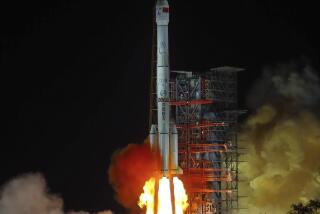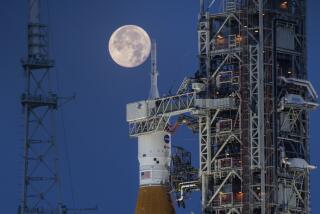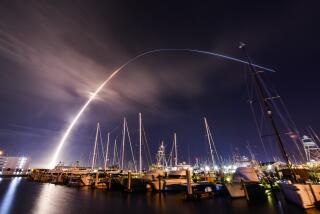In one small step for space business, Moon Express is cleared for lunar mission
- Share via
Lunar exploration and mining firm Moon Express has become the first private company to receive government approval to land on the moon, possibly providing another boost for the commercial space industry.
Armed with the go-ahead from the Federal Aviation Administration, the Cape Canaveral, Fla., company plans to launch its unmanned MX-1 lunar lander next year. Previously, only national government agencies have launched missions beyond Earth orbit.
For the record:
2:40 p.m. Aug. 3, 2016A previous version of this story said Moon Express’ headquarters were in Mountain View, Calif. The company is based in Cape Canaveral, Fla.
“We look at the moon as our eighth continent,” said Naveen Jain, co-founder of Moon Express. “We have explored all of our seven continents, so why not go to the eighth continent.”
On its first mission, the MX-1 lander is expected to take scientific experiments, telescopes and other items to the moon in a test of the spacecraft’s software. The lander is set to launch on one of Los Angeles-based Rocket Lab’s Electron rockets.
Eventually, Moon Express plans to mine for resources on the moon, such as platinum group metals and helium-3, which some believe could be a safer nuclear fuel and is present in larger quantities on the moon than on Earth, according to the European Space Agency.
Analysts said the approval process could serve as precedent for future private moon missions, as well other commercial ventures beyond Earth orbit, such as SpaceX’s mission to Mars, set for 2018, or other firms’ plans to mine asteroids for resources.
“It highlights the need for … a formal regulatory process for unconventional commercial missions,” said Phil Smith, senior space analyst at the Tauri Group.
The final approval for the mission came after consultation among the Federal Aviation Administration, the White House, NASA and the State Department, Moon Express said.
This level of coordination was necessary because a mission like that of Moon Express is subject to the Outer Space Treaty of 1967, an international regulatory agreement initiated by the U.S. and Russia.
Among other things, the treaty states that missions to the moon and other celestial bodies must be peaceful and that nongovernmental agencies must get approval from a particular country for activities in outer space.
The FAA issues launch licenses to commercial space companies and gives approval to spacecraft, like SpaceX’s Dragon capsule, that come back to Earth after blasting into space.
But no regulatory agency has authority over commercial activity beyond Earth orbit.
In this case, the FAA approved the MX-1 lander, confirming that its launch does not jeopardize public health, safety, U.S. national security or foreign policy interests, or the nation’s international obligations, the agency said.
The FAA’s approval is restricted to this single mission, and any future missions would have to receive similar clearance from the agency.
Moon Express will also still have to secure a launch license from the FAA, but that part will be less of a hurdle because there is a defined process for it, said Justin Karl, coordinator of the commercial space operations program at Embry-Riddle Aeronautical University.
“It’s difficult to get any type of operational licensing when you’re trying to do something that no one has ever done before,” he said. “The fact that a comparatively small outfit like Moon Express has been given the OK to do some unique type of operations that other larger and theoretically more capable aerospace companies have not been able to get before is a very big step for commercial space.”
Moon Express, which currently has 26 employees, is a contender for the Google Lunar X-Prize, a competition that will award $20 million to the first team that lands a privately funded rover on the moon, travels at least 500 meters and transmits high-definition video and images back to Earth by the end of next year.
The company is competing against 16 other teams, including two based in the U.S. Both Pittsburgh’s Astrobotic Technology and Orlando’s Earthrise Space Foundation aim to deliver experiments to the moon for universities and companies.
Beyond its mission approval, Moon Express still has many challenges to overcome before launch. The company said that more details about the lander will be released in the next few months. Meanwhile, its ride into space — Rocket Lab’s Electron rocket -- has yet to take its first flight.
“The fact that they are this far certainly speaks volumes about what they’ve developed and how mature private space is getting,” Karl said. “But, really, the moon is still both literally and figuratively quite a long distance away.”
For more business news, follow me @smasunaga
UPDATES:
2:42 p.m.: This story has been corrected to include Moon Express’ headquarters in Cape Canaveral, Fla.
1:40 p.m.: This article was updated throughout with additional details about the regulatory process and the Google Lunar X-Prize.
This article was originally published at 5 a.m.
More to Read
Inside the business of entertainment
The Wide Shot brings you news, analysis and insights on everything from streaming wars to production — and what it all means for the future.
You may occasionally receive promotional content from the Los Angeles Times.











